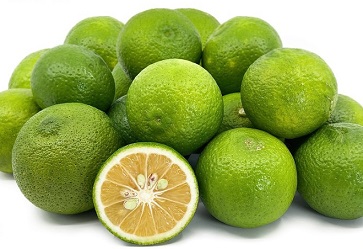Herbs And Phytochemicals: Japanese Study Finds That Polymethoxyflavones From Citrus Sphaerocarpa Could Help In Managing Obesity!
Nikhil Prasad Fact checked by:Thailand Medical News Team Dec 10, 2023 2 years, 2 months, 3 days, 14 hours, 8 minutes ago
Herbs And Phytochemicals: Obesity, a multifaceted global health challenge, has reached epidemic proportions with over 1.9 billion adults classified as overweight and 650 million as obese, according to the World Health Organization. Lifestyle choices contribute significantly to the rise in obesity, leading researchers worldwide to explore innovative solutions beyond conventional treatments. A groundbreaking
Herbs And Phytochemicals study conducted by Mie University in Japan, in collaboration with Tsuji Oil Mills Co., Ltd., has uncovered promising anti-obesity properties in the hexane extract of Citrus sphaerocarpa (CSHE), shedding light on a potential breakthrough in obesity prevention and management.
 Citrus Sphaerocarpa
Understanding the Obesity Epidemic
Citrus Sphaerocarpa
Understanding the Obesity Epidemic
Obesity is a complex health issue driven by an imbalance between calorie intake and expenditure, resulting in the abnormal or excessive storage of adipose tissue. Associated with a myriad of health problems including hypertension, cardiovascular diseases, diabetes, musculoskeletal disorders, osteoarthritis, and cancer, obesity is now officially recognized as a disease. While current treatments primarily focus on lifestyle modifications, including calorie restriction and increased physical activity, their efficacy is often limited, prompting researchers to explore alternative solutions.
The Rise of Natural Products in Obesity Research
In recent years, natural products (NPs) and their bioactive compounds have gained attention as potential allies in the fight against obesity. With fewer side effects compared to traditional pharmacotherapy, NPs derived from plants, animals, and bacteria have shown promise in ameliorating obesity and its related metabolic disorders. Among these, citrus fruits stand out as rich sources of bioactive compounds, including vitamins, phenolic acids, and flavonoids.
Citrus-Derived Polymethoxyflavones (PMFs): Nature's Anti-Obesity Arsenal
The focus of this study, Citrus sphaerocarpa, commonly known as "Kabosu" in Japan, boasts unique taste profiles and essential oil content derived from its peels. Of particular interest are polymethoxyflavones (PMFs), a class of compounds primarily found in citrus peels. PMFs, including glycosides like hesperidin and naringin, as well as O-methylated flavone aglycones like nobiletin and tangeretin, have demonstrated anti-inflammatory, antioxidant, and anti-cancer properties in various studies.
Previous research has highlighted the role of citrus-derived PMFs in preventing obesity and related metabolic disorders. These compounds inhibit apoB secretion and regulate lipid synthesis, making them attractive candidates for obesity management. For example, PMFs derived from Citrus aurantium L. have been shown to prevent high-fat-diet-induced obesity in mice by promoting adaptive thermogenesis in adipose tissues.
&
;nbsp;
Citrus Sphaerocarpa (CSHE): An Untapped Resource in Obesity Research
Despite the known anti-obesity activity of citrus fruit peels, the effects of Citrus sphaerocarpa supplementation on obesity have been largely unexplored until now. In a prior study, researchers at Mie University demonstrated that the hexane extract of C. sphaerocarpa (CSHE) suppressed lipid accumulation in differentiated 3T3-L1 adipocytes, suggesting its potential as an anti-obesity agent.
In-Depth Analysis of CSHE's Impact on Obesity: From Zebrafish to Mice
The recent study aimed to comprehensively evaluate the impact of CSHE on obesity using zebrafish and mouse models. In zebrafish juveniles, CSHE exhibited a significant inhibitory effect on visceral fat accumulation, establishing its potential in preventing obesity even in aquatic organisms. The study further progressed to high-fat-diet-induced obese mice, where oral administration of CSHE resulted in tangible benefits, including reduced body weight, visceral fat volume, and hepatic lipid accumulation.
Unveiling the Molecular Mechanisms: CSHE's Regulation of Lipid Metabolism Genes
To unravel the molecular mechanisms behind CSHE's anti-obesity effects, the study delved into the gene expression profiles associated with lipid metabolism. In the liver tissues of CSHE-treated mice, lipogenesis-related genes, including peroxisome proliferator-activated receptor gamma (Pparg), sterol regulatory element-binding transcription factor 1 (Srebf1), and CCAAT/enhancer binding protein alpha and beta (Cebpa and Cebpb), showed no significant changes. However, lipolysis and fatty acid β-oxidation-related genes, such as peroxisome proliferator-activated receptor alpha (Ppara) and its target genes acyl-coenzyme A oxidase 1 and palmitoyl (Acox1), were significantly upregulated.
In eWAT, CSHE inhibited the mRNA expression of fatty acid synthase (Fasn) and upregulated Cebpa and Cebpb. The activation of lipolysis-related genes, such as Ppara, and the upregulation of peroxisome proliferator-activated receptor gamma coactivator 1 alpha (Ppargc1a) were observed, indicating CSHE's potential in promoting fatty acid β-oxidation and preventing lipid accumulation in both the liver and visceral adipose tissue.
CSHE's Impact on Signaling Pathways: A Glimpse into the Future of Obesity Research
Fluorescence immunostaining provided visual evidence of CSHE's impact on key signaling pathways, including PI3K/AKT and AMPK/ACC. Enhanced phosphorylation of AKT, AMPK, ACC, and FoxO1 in CSHE-treated mice suggested a regulatory role in adipogenesis and lipolysis through these pathways.
Future Directions and Implications
The study's findings position CSHE as a promising candidate for further exploration in the field of obesity research and treatment. As research progresses, understanding the specific components of CSHE and their synergistic effects may unlock new possibilities in preventive medicine and pharmacology. Future studies are needed to delve into the nuanced mechanisms, including the potential impact on acetyl-CoA levels, as well as the broader implications of CSHE in combatting ectopic lipid accumulation.
In conclusion, the Japanese study on Citrus sphaerocarpa's hexane extract marks a significant step forward in the search for safe and effective anti-obesity interventions. As the obesity epidemic continues to pose global challenges, natural products like CSHE offer hope for a sustainable and side-effect-free solution. The intricate molecular pathways uncovered in this study provide a roadmap for future research, paving the way for innovative preventive and therapeutic strategies in the ongoing battle against obesity. As CSHE emerges as a potential game-changer, the intersection of nature and science holds the key to unlocking new frontiers in obesity management.
The study findings were published in the peer reviewed journal: Molecules.
https://www.mdpi.com/1420-3049/28/24/8026
For the latest on
Herbs and Phytochemicals, keep on logging to Thailand Medical News.
